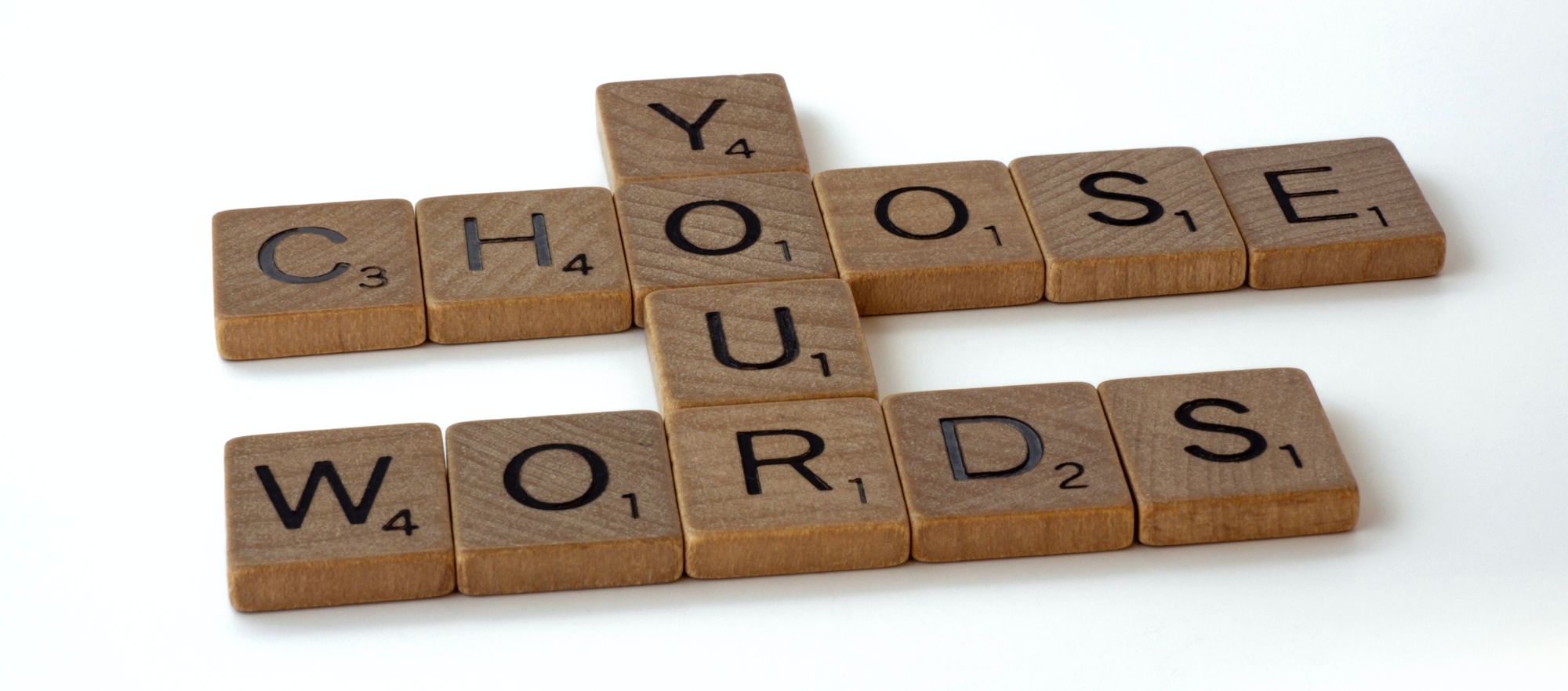Words Matter


Why choosing the right words makes all the difference
Did you know that you can transform your reality simply by the words you choose to describe yourself and the events in your life?
Our words influence our thoughts, emotions, and behaviors. Language impacts the way we see ourselves and the world around us. When we use empowering language we start to feel confident, capable, and motivated which in turn leads to more happiness and success.

How empowering language changed the game for one of my clients.
I was recently coaching a woman whose business was struggling. In her mind, it was 100% her fault. She told me all the things she did wrong to cause the problem completely leaving out changing conditions in her industry, a difficult economy, the challenge of hiring, and so on. Our eyes met and she said: “I just need to fix it but I’m not doing it.” It was the language of I can’t, it’s out of my control and I’m not okay.
I invited her to try this instead:
“I will do what needs to be done when it is the right time for me.”
This flipped the story from one of helplessness to one of empowerment. It was her choice about what to do and when. She was choosing not to do it now but at the time that was right for her. She took responsibility for the timing of her actions and stopped beating up on herself because she hadn’t done it yet.
Her whole face changed as she said it. The weight of self-doubt and criticism was becoming one of confidence and ease.

The other reason I use this approach with people is that once you give yourself permission to not do something you let go of the struggle. When you let go of the struggle space opens up for you to choose it.
For example, in my case, I was resisting exercising because I wasn’t enjoying it. I started to dread exercising and it became a daily struggle. Finally, I said to myself, “I hate to exercise so I give myself permission not to do it.” After a few weeks, I was surprised to notice that I actually started to miss it. By giving myself permission to let it go, I dropped the struggle and made space for a different relationship to it. Now, I enjoy doing yoga every day.
What is Empowering Language?
Empowering language is positive and affirming and focuses on our strengths and potential, rather than weaknesses and limitations. Empowering language inspires and motivates. It encourages growth and fosters a sense of confidence and self-esteem. It looks to the possibilities of the future rather than to the problems of the past. It focuses on what you can do rather than what you can’t do.
According to neuroscientist Dr. Andrew Newberg and communications expert, Mark Robert Waldman, authors of the book Words Can Change Your Brain: 12 Conversation Strategies to Build Trust, Resolve Conflict, and Increase Intimacy, “a single word has the power to influence the expression of genes that regulate physical and emotional stress.” Think about that!
Here are some examples of how you can transform disempowering language into empowering language:
- “I should, I have to, or I need to.” becomes “I want to, I choose to, I’m deciding to.”
- “I’m not smart enough, I can’t." becomes "I’m learning, I know it’s a process, I can."
- “This is too hard." becomes "It’s a challenge and an opportunity to grow.”
- “I didn’t finish it.” becomes “I’m working on it and making progress.”
What are the benefits of Empowering Language?
Research shows that Empowering Language can:
- Ease worry and reduce anxiety
- Build or restore a sense of competence
- Improve self-esteem
- Challenge negative thoughts
- Elevate your mood
- Relieve the symptoms of depression
- Stop self-sabotaging behaviors
Yet
Simon Sinek, author of Start With Why and The Infinite Game, advocates for the use of “yet”. Instead of saying “I still haven’t done it” say “I have not done it yet.” That simple three-letter word indicates that you can do it in the future. It looks to possibilities.
See how adding “yet” changes meaning completely:
I don’t have a partner vs. I don’t have a partner yet.
My business isn’t a success. vs. My business isn’t a success yet.
I never finished my book. Vs. I haven’t finished my book yet.
I don’t know how to cook. Vs. I haven’t learned how to cook yet.
Affirmations
Positive affirmations are another way to use empowering language. They are statements that focus on strengths and potential. When you repeat positive affirming statements, you are training your brain to accept your affirmations as fact. This makes you more likely to take action toward achieving your goal.
Examples of positive affirmations include:
- I am capable.
- I am worthy of love and respect.
- I am successful.
- I am strong.
- I have everything I need - I am living with abundance.
- I am growing into the person I want to be.
- Obstacles motivate me to learn and grow.
Affirmations must be something that you believe is true for you - there is no tricking our subconscious so make sure your affirmations are something you can believe. The important thing is to pick the most positive one that’s true for you. Maybe you don’t feel you are strong but you might be able to believe "I’m getting stronger every day."
Like my client, if you’re feeling helpless in a situation you can create an affirmation that helps you to see yourself as in charge of your choices like “I am capable of figuring this out.” If you’re stuck on a problem you can make an affirmation like “Sometimes it takes a while but a solution always comes.” if that feels true for you. One that I find very helpful in stressful situations is “Everything is okay right now.” This helps move me into the present and away from perseverating on the past or worrying about the future.
Be the Hero of Your Own Story
Empowering language puts us in the role of the hero of our own story. When we choose to see ourselves as victims, we're giving up our power. We're saying that we're not in control of our own lives and are helpless to change our circumstances. But when we choose to see ourselves as the heroes of our own lives, we're taking back our power. We're saying that we're in control of our own lives and that we have the ability to change our circumstances.
In Practice
Is there some negative self-talk you would like to turn around? Identify one area where your inner critic is particularly harsh and see if you can find an empowering statement for it. Let me know how it goes for you.
Love,
Darcy
Notes:
- To leave a comment scroll to the top of this post, and click view online.
- Share this post on social media: scroll to the top of this post, click view online and click the icons at the top of the post
- Share this post with a friend. Anyone can subscribe here.
- Visit me on Instagram
Coaching
I have a few slots opening up in my coaching practice. If you would like to work toward a more exciting and fulfilling life contact me at darcy@shibui-life.com. I specialize in helping people break through self-imposed barriers to live more dynamic and satisfying lives.
I'll work with you to create a customized plan that can help you make real progress toward achieving your dreams. Whether you need accountability, guidance, inspiration, or simply a more useful perspective, I'll be there to support you every step of the way.
So if you're ready to take the first step towards a happier, more rewarding life, I encourage you to reach out and schedule a complimentary Zoom session to see if working with me is the right fit for you. Contact me at darcy@shibui-life.com.
Together, we can unlock the potential that's waiting for you.
